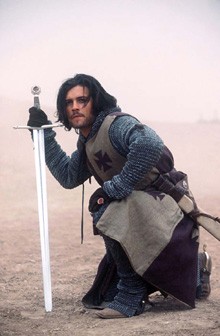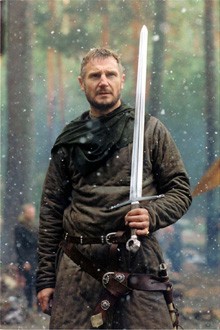Ridley Scott's Crusade begs comparison to other last stands
| Hopeless odds against an implacable enemy, anyone? Orlando Bloom is the Jew Balian, who film critic Steve Kellman likens to the Alamo's William Travis, in Ridley Scott's Kingdom of Heaven. |
However, the setting in Kingdom of Heaven is not San Antonio de Bexar, but medieval Jerusalem, where Saladin leads 200,000 Muslim warriors against a population that an earlier massacre has depleted of able-bodied men. The combatants seem unaware of another nearby Alamo: Masada, where, in 73 A.D., 1,000 Jewish zealots committed suicide rather than surrender to 15,000 Romans surrounding their mountain fortress. Remember the Alamo, and don't forget Thermopylae, where in 480 B.C. Persian forces overwhelmed a stubborn troop of Spartans. All the world's a desperate battle against implacable foes.
In the defense of Jerusalem, as portrayed in Kingdom of Heaven, the role of Colonel William Travis is played by Balian (Bloom), a young French blacksmith who recently has learned he is a baron's bastard son. Despondent over the death of his child and the suicide of his wife, Balian journeys to the Holy Land, which following the Second Crusade is controlled by European Christians. Balian is befriended by Tiberias (Irons), an uncommonly wise general who observes, "I would rather live with men than kill them," and detested by the odious Guy de Lusignan (Csokas), a foppish opportunist who seizes power by waging war.
The early death of benign King Baldwin, a leper who lives within a silver body mask, gives Guy his chance and the Middle East is soon the site of Christian-Muslim carnage.
The film concludes with a gratuitous printed reminder: "Nearly a thousand years later, peace in the Kingdom of Heaven remains elusive." Kingdom of Heaven is a historical epic shot - safely, in Morocco and Spain - while Western forces are again mired in ferocious conflict in western Asia. But anyone seeking reassurance that wasting Iraq is a Christian thing to do will be disappointed by Ridley Scott's take on the clash of civilizations. From a nasty village priest who filches trinkets off corpses to a smarmy bishop who would abandon his flock to save his own thick neck, the religion that rules Europe is depicted as blatantly unchristian. "To kill an infidel is not murder," proclaims a righteous pilgrim. "It is the path of heaven." In the Kingdom of Heaven that gives this film its name, it is a Muslim warrior who is the prince of peace.
In Scott's Black Hawk Down, murderous Muslim hordes prowl the streets of Mogadishu, but in Kingdom of Heaven, where the word "jihad" is never uttered, the fanatics are not Islamic. That is not to say that the troops who cross the desert from Damascus are gentle Sufi mystics. Wielding swords, axes, arrows, catapults, fire, and battering rams, they inflict enormous damage on the Europeans. But they act to avenge a recent Christian atrocity and regain Jerusalem a century after Crusaders annihilated its Muslim residents. Much of the film consists of lavish combat footage. Against a vast Biblical landscape, Scott uses closeups, aerial shots, slow motion, horses, camels, and a cast of thousands to turn butchery into spectacle, presumably to illustrate the irony of irrigating the Holy Land with blood.
| Liam Neeson plays Crusader Godfrey. |
More attractive is Saladin, the valiant leader of the Arab forces (played by Syrian actor Ghassan Massoud). Though adept at waging war, Saladin prefers saving lives to slaying them. He is unlike any other Muslim I can think of in Western movies - except the virtuous Indian chief in countless Westerns. Unlike the pale-faced intruders, Saladin does not speak with forked tongue, but rather in the clipped pidgin that marks the most noble of noble savages. (The Europeans all speak glibly in modern English, even when they are supposed to be medieval Frenchmen. Doesn't anyone know Latin? And why is Saladin expected to converse in halting English when Balian's Arabic is limited to the familiar "salaam aleikum?")
Saladin cancels his assault against Christian marauders when King Baldwin promises they will be punished. It is only when the malefactors escape punishment that Saladin, reluctantly, begins his assault on Jerusalem. He is the ironic antithesis of Osama bin Laden - and George W. Bush - when he agrees to spare the lives of all the city's defenders in return for the city. Imagine a conclusion to the Battle of the Alamo in which Santa Anna grants Travis, Bowie, Crockett, and the others safe passage out of Texas if only they vacate their battered mission. In Scott's fond fantasy of honorable Muslim leadership, peace might come if only foreign armies left the Middle East. •



